Was Truman Capote's Black-and-White Ball the Greatest Party Ever?
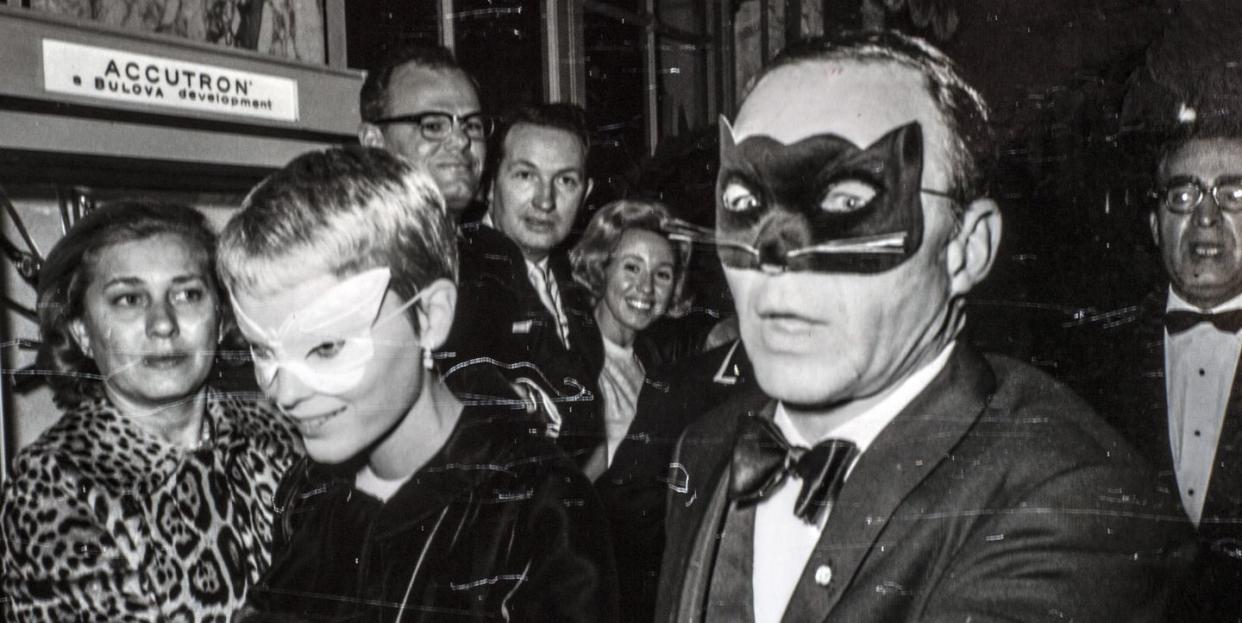
Before there was Rock 'n Roll, there were parties, and if you really wanted to party, you gave a ball. Twenty-five years ago, Truman Capote threw “a little masked ball” for 540 of his closest friends on November 28, 1966. It was the largest private party ever given, if “private” is a term that can be used for an event that garnered more publicity than the Academy Awards. Everyone wore black and white. No uninvited guests permitted. Rose Kennedy, Arthur Schlesinger Jr., Tallulah Bankhead, Norman Mailer, and William and Babe Paley were just a few of those assembled in the Grand Ballroom of the Plaza Hotel in New York to pay homage to Capote, to his guest of honor, Washington Post Company president Katharine Graham, and to those shimmering gods, celebrity and power.
A year afterward, this magazine declared: “We wouldn’t have come even if you had invited us, Truman...”
Well, we were wrong.
Here is George Plimpton’s oral history of a spectacular occasion that served as an eye in the storm of the Sixties, and was, as others put it, one of Truman Capote’s greatest creations.
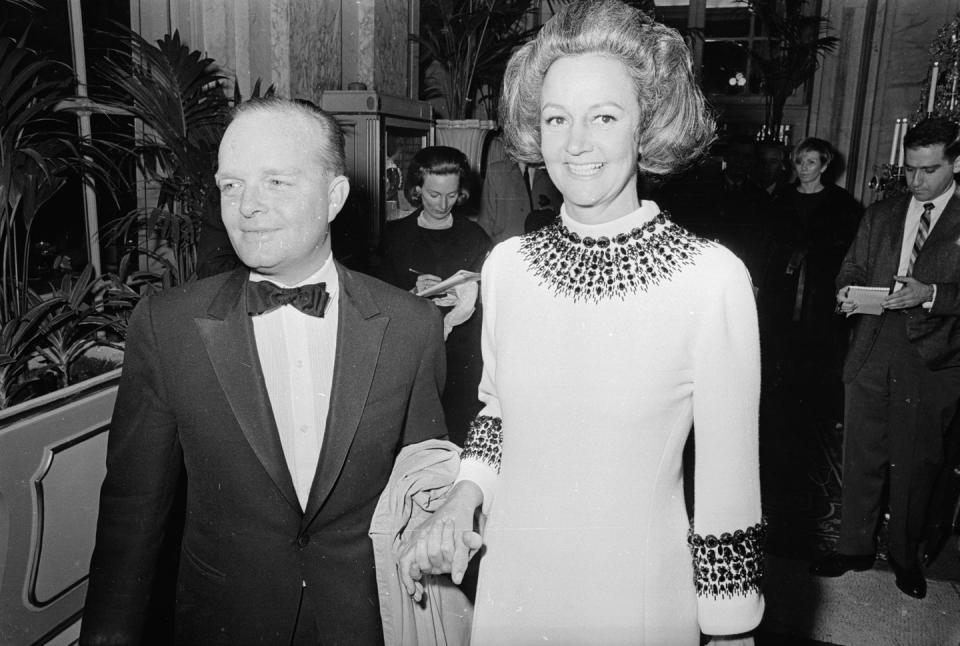
KATHARINE GRAHAM, guest of honor: Truman called me up that summer and said, “I think you need cheering up. And I’m going to give you a ball.” Well, I said, “I don’t need cheering up, and what are you talking about?” He said, “Yes, yes, I’ve always had this idea of a black-and-white ball.” He told me that he’d always loved the black-and-white scene at the racetrack in My Fair Lady. Also, he said that he loved the ballroom in the Plaza and had always wanted to have a party there.
I was sort of baffled. But then he got rolling. I felt a little bit that Truman was going to give the ball anyway and that I was part of the props. Perhaps “prop” is unfair, but I felt that he needed a guest of honor and with a lot of imagination he figured out me.
ASHTON HAWKINS, museum executive: Truman recognized that she was a powerful woman who didn’t really know anything about the big world in those days. She hadn’t pursued it or expected to. She was unused to the attention and not at all comfortable with it. That was a long time ago. She didn’t seek it out, but she was quite pleased that somebody else would do it for her.
LEO LERMAN, editor: The ball was one of his major works. As much a major work as some of his short stories. He sat there planning it all summer long, surrounded by these notebooks. I thought, What is he writing? It turned out to be this ball. He had the most marvelous time doing it. One of the things he adored saying was “Well, maybe you’ll be invited and maybe you won’t.” The ball was ostensibly for Kay Graham. It was for Truman.
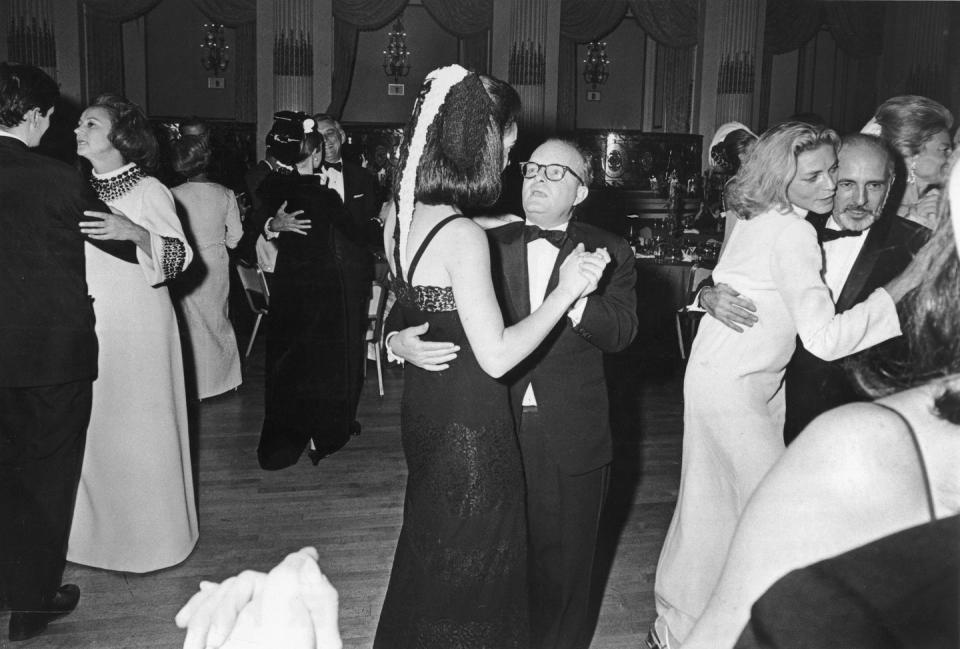
LEE RADZIWILL ROSS, friend: I think Truman was more excited by the preliminaries of it, by who he’d invite, and who he definitely would not invite.
DOMINICK DUNNE, writer: Two years before Truman’s ball, on my tenth wedding anniversary, Lenny and I gave a ball where the ladies were asked to dress in black and white. We had a policy that no one could bring houseguests because there was limited space. At the last minute Truman called and said, “Yes, yes, I’m going to be there, but I’m bringing three guests.” Well, we didn’t have the nerve to say no to him. They turned out to be people involved in the In Cold Blood case.
It was a very glamorous affair, filled with film stars; Truman loved it. I have these incredible photographs of him dancing with Tuesday Weld, talking to Jennifer Jones. He was one of the last ones to leave. Then two years later he gave his great black-and-white ball and guess what: He didn’t invite us!
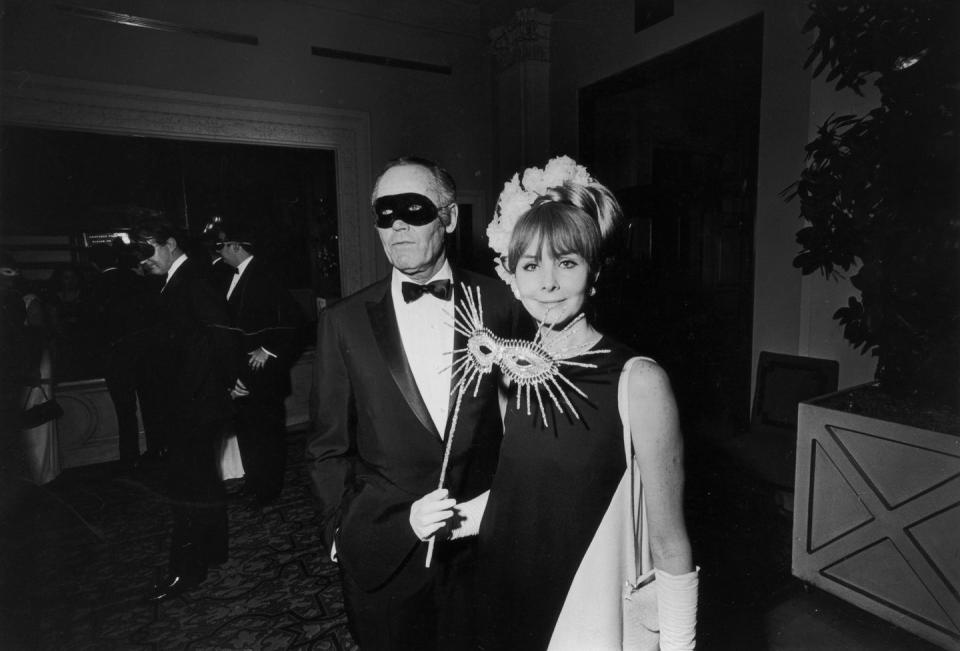
GEORGE PLIMPTON, writer: Truman kept his guest list all that summer. I remember one day at the Bennett Cerfs in Mount Kisco. It was hot, and the luncheon guests gathered around the swimming pool that afternoon—Frank Sinatra, Mia, his young wife then, and Truman of course. Mia, in a black bathing suit as I remember, was lying on her back in the sun by the edge of the pool—just enchanting, when suddenly a butterfly landed on the exposed part of a breast, just above the line of her bathing suit. It was absolutely beautiful, and we all stared, spellbound. Then Truman broke it, quite abruptly. “What about the Goetzes?” he called out loudly, or some such name. “Should I invite them or consign them?”
KAY MEEHAN, friend: Truman told me once, “The point and fun of giving a party is about those you don’t invite.”
SHANA ALEXANDER, writer: I had just gotten divorced, was newly arrived from California, and was having dinner in New York with David Merrick. David said, “I’m going to a party called a black-and-white ball and you’re not invited so you can’t come. Truman is giving it.” I happened to notice that at the next table a piece of paper curled in the glass read: CAPOTE. In other words, Truman’s table was reserved, right at the next banquette. So I went into the ladies’ room and wrote on my card, “Have black-and-white dress in suitcase, just hit town.” I thought if I stuck it in Truman’s pocket unobtrusively and he didn’t want to invite me, it wouldn’t be embarrassing. He would simply find this card in his pocket from an old friend.
Truman came and sat down. To make himself slim he had on one of those suits with no pockets. I kept trying to find a pocket to slip my card into. He finally asked, “What the hell are you doing?” “I was trying to put this card in your pocket,” I said. He looked at it and said, “Of course you can come, I’d love to have you come to my party!” Merrick, well—his balloon was punctured, but mine was blown up.
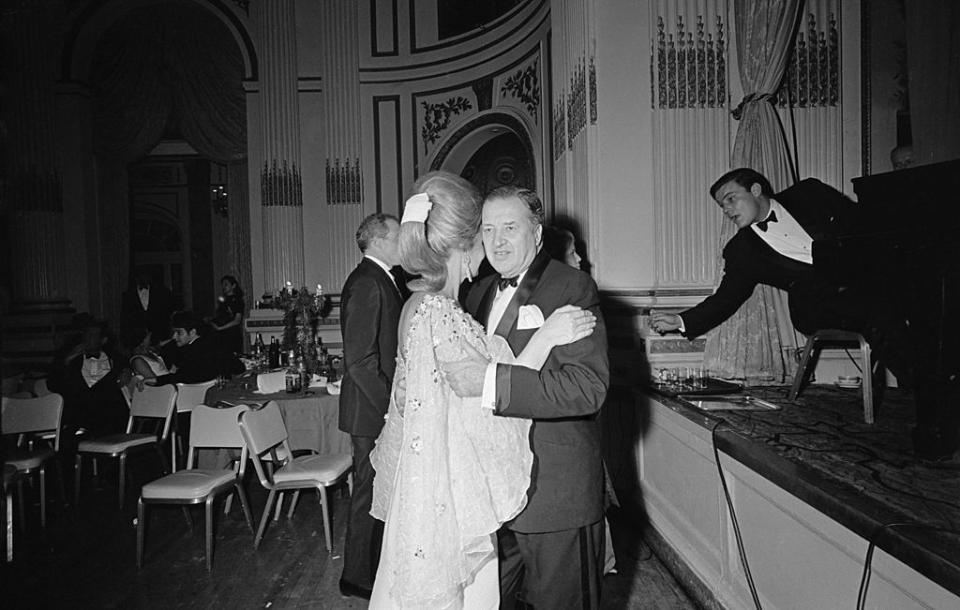
PETER DUCHIN, musician: We had been asked by Truman to play at his ball. He’d said to me, “Please don’t tell anybody.” Of course everybody knew instantly, because there was an awful lot of talk about the ball before it was given. One day I got a call from Earl Wilson, the columnist. Earl said to me, “Gee, Peter, I hear you’re playing Truman Capote’s ball.” I said, “Yes.” He said, “Well, you know they’re not allowing the press in at all.” I said, “Earl, that is unfortunate and what a shame.” “Well,” he said, “I wonder if you’d consider letting me sneak into the party as one of your trombonists.” I said, “Let me think about this, Earl.” I thought it wouldn’t be a terribly good idea, though, in fact, Earl did look like a trombone player.
ELEANOR FRIEDE, friend: Truman was absolutely terrible about his guest list. If he liked the husband and didn’t like the wife he’d invite the husband. He was ruthless.
R. COURI HAY, gossip columnist: Truman always claimed that he invited five hundred of his friends and made fifteen thousand enemies.
DENISE BOUCHé, friend: I looked pretty silly. At Kenneth’s I had my hair dyed black on one side and powdered white on the other; I wore it sort of like Madame Pompadour. I had a mask—Saint Laurent did it for me—it went perfectly with a dress I already had. So I didn’t have to do much except for my hair. I was rather embarrassed to find myself sitting next to Kay Graham—with my hair going black and white while she seemed to be having a fairly simple hairdo!
KATHARINE GRAHAM: I’d been over there the week before and this woman said, “We’re all so busy preparing for the ball.” It was sort of like Cinderella: I said, “Well, the ball’s being thrown for me.” She said, “The ball’s being thrown for you? Well, who’s doing your hair?” And I said, “I don’t know, Jonathan somebody,” and she said, “Well, Kenneth has to do your hair.” Which he did, after he put thousands of ringlets in Marisa Berenson’s hair.
ADOLFO, designer: The orders for masks came in weeks before the ball. Oh, we did many, many—for Drue Heinz, Adele Astaire, Merle Oberon, Amanda Burden, Betsy Bloomingdale. Hers I remember best—a very delicate one, in the shape of a butterfly and held up on a stick. A mask that fits the face disturbs the makeup, so they all had little sticks to hold, sometimes in the middle, sometimes on the side. I was invited to the ball, but I don’t do very well at such things. So Truman came in later and told me all about it.
WILLIAM STYRON, writer: I had the same counterimpulse to the Black-and-White Ball as Peter Matthiessen did. We both decided we didn’t want to go. My wife, Rose, went. I didn’t go. I don’t know why. I always sort of regretted that later.
MARIA THERESA CAEN, friend:I flew from San Francisco to New York carrying my mask. I couldn’t put it in my bag, it would have been all squashed. It was on a stick, covered in cellophane, and literally everyone—porters at the airport, cab-drivers, strangers—knew I was going to Truman’s ball. They’d say, “Oh! You’re going to Truman’s party!” Not “Capote’s party” but “Truman’sparty.” It was so intimate.
HERB CAEN, columnist: It was the talk of New York. As soon as someone saw you with a mask or headdress, they said, “Going to Truman’s ball, huh?” New York had that funny, small-town feel to it; that part was fun. It was like the Super Bowl. There was such a buildup that by the time the game was played, it didn’t amount to much.
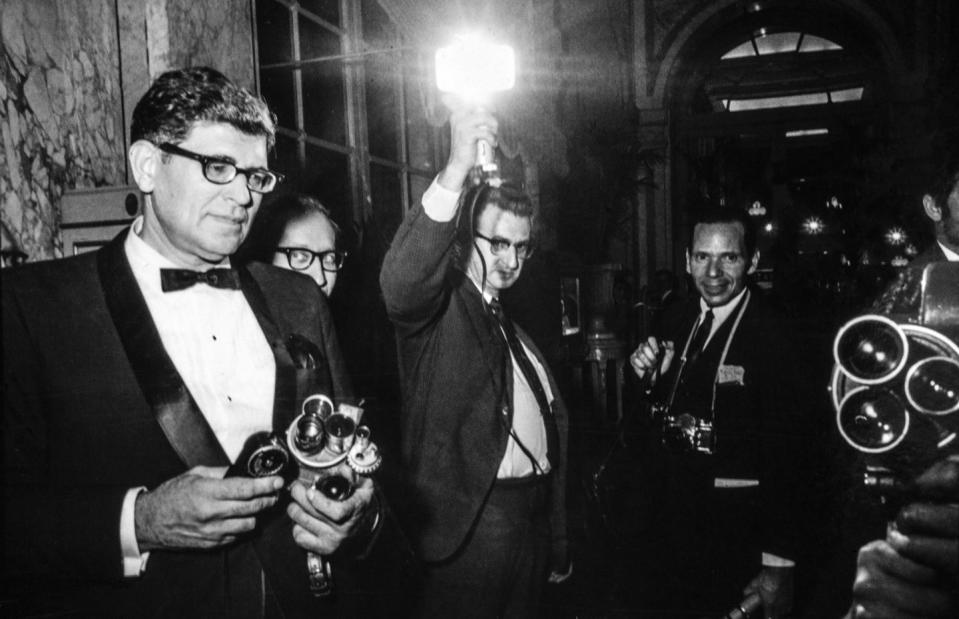
PHYLLIS CERF WAGNER, friend: I guess we were all glad to be there. It was a good party as parties go. I mean, certainly the world was there, and you wouldn’t have wanted to be left out of the world.
JOEL SCHUMACHER, film director: There were dinner parties before the ball. Who was invited to whose party was very important. Afterward, buses with manned bars took everyone to the Plaza. Hosts and hostesses, as I remember, were extremely nervous. They had given their word to Truman that they would be on time. They had to make sure that their parties didn’t last too long. There was a wonderful man who worked at Vogue, the Baron Nicolas de Gunzburg, one of the taste arbiters. He was very droll. The hostess of the dinner he was going to was so nervous about being late that she kept calling him, saying, “Now, we’ve promised Truman we won’t be late….” This was about two days before the party. He said, “Well, why don’t we just get dressed and go now? We won’t be late.”
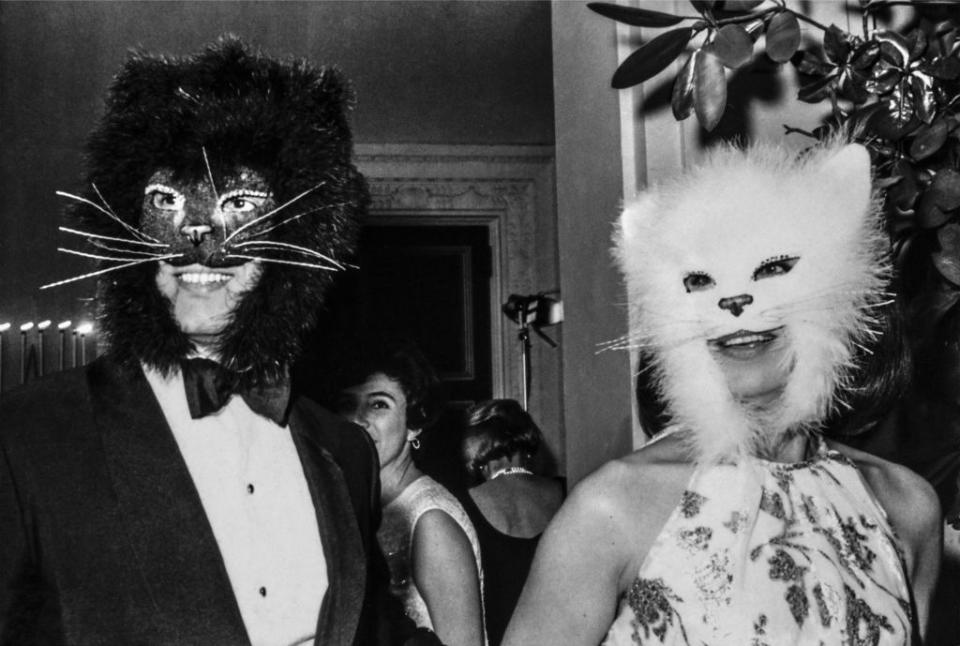
NORMAN MAILER, writer: I met Pat Lawford at dinner before the party. Piedy Gimbel gave the dinner. Lawford and I were seated next to each other. We did nothing but insult each other all night. It was wonderful. She said, “I don’t know why I’m sitting next to you. I’ve heard you’re awful,” or some extraordinary thing. I said, “Well, that just shows how dumb the people are that you know.” We’ve gotten along ever since.
MARY “PIEDY” GIMBEL LUMET, friend: We gave one of the dinners before the ball. We had the writers. Norman Mailer sat next to me. He said, “You ought to be an elevator operator. You just go up and down.” I don’t even want to think about what he meant by that.
JOHN KENNETH GALBRAITH, economist: Kitty and I went to Jean Stein’s dinner beforehand, where I sat next to Alice [Roosevelt] Longworth. Josephus Daniels’s memoir about Franklin Roosevelt had just been published, which for the first time gave wide recognition to the existence of Lucy Mercer. So I asked her about that and got a marvelous Longworth response, which I don’t think has ever been repeated: “Absolutely nothing to it—everybody knows that Franklin was paralyzed from the waist down.”
KATHARINE GRAHAM: Truman and I had drinks at William and Babe Paley’s. After that we went off to a room upstairs in the Plaza and had a box dinner that I’d ordered from ‘21.’ Then, at about 10:00, we went downstairs to stand in the receiving line.
JOHN KNOWLES, writer: The masked ball was a hoot. I felt as though we were at Versailles in 1788. People were applauding us in the street as we walked in. I remember arriving at the side entrance of the Plaza. There was a solid phalanx of news media. I forget exactly what group I was with, but no stars were with us. All the klieg lights went on because we were masked. They turned on the lights and looked at us. Nobody. The lights went off again.
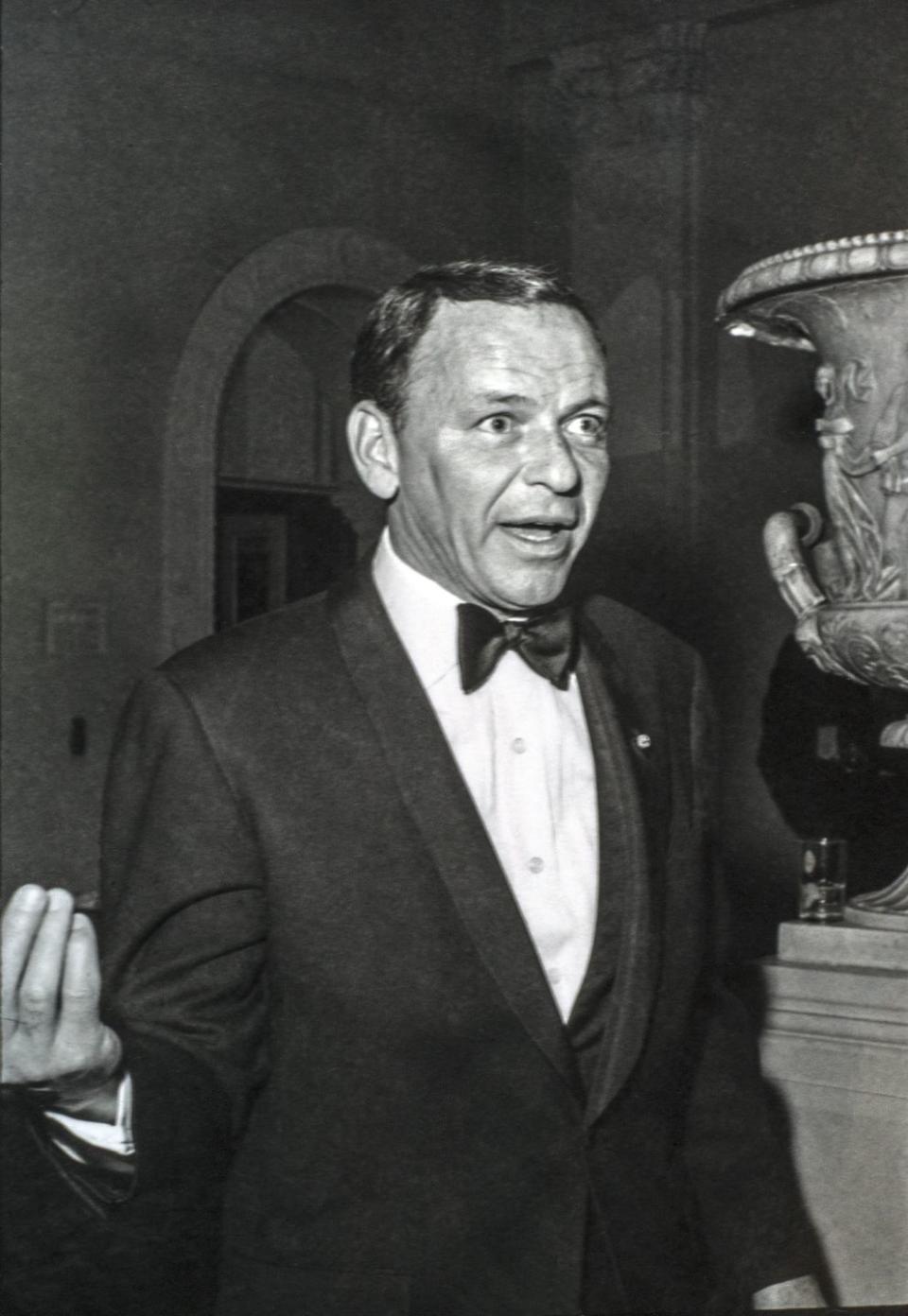
JOHN KENNETH GALBRAITH: I didn’t buy a mask. Since I’m six foot eight and a half inches tall, the likelihood that I would be concealed by a mask was minimal. We made our way up the stairs to the ballroom just behind Bill Buckley and his wife, Pat, who turned and said to me, “I’m going to choke you before the evening is over for what you said about Bill.” I’d forgotten what the hell it was I said.
WILLIAM F. BUCKLEY JR., editor: I recall meeting Ken Galbraith for the first time. It was rather extraordinary in that he took the occasion to apologize for an indiscretion he felt badly about. He had upbraided a distinguished economist for having written for the National Review at the time President Kennedy was killed. It was an entirely emotional decision, the idea that nobody that high up in academe ought to be associated with any magazine that opposed Jack Kennedy so strongly. Well, I remember he took the occasion to apologize for having done that.
JILL FOX, friend: I was wearing a great boa of white ostrich feathers. And every time I breathed, a feather would shoot up my nostrils. A photograph appeared somewhere of me being greeted by Truman. It was of a strange person I don’t think I ever knew in my life, and it was myself … very thin, smiling brightly, and Truman looking over my shoulder….
HAROLD PRINCE, producer: It was the last time we ever went to anything remotely like that. Judy and I were back out on the street within half an hour. I remember I was incredibly uncomfortable about the whole thing. At the Plaza I got a lot more uncomfortable because of the people on the street. Truman was enormously nice. But we sat down, took one look around us, and quietly left, out of discomfort. I would lie if I didn’t say out of disapproval too. But we went, didn’t we?

POLLY KRAFT, friend: All of us from Washington were rather terrified, titillated, thrilled to be invited. Those swan-necked Italians were just ravishing … Marella Agnelli just like Richard Avedon’s portrait of her…. Babe Paley. Gloria Guinness. One was almost numb with the glamour and excitement of it all. Of course, we were all younger then. None of us had become blasé or jaded.
GORDON PARKS, photographer: Everyone was looking at each other. Quite a lot of nervous bowing and greeting. I went with my second wife, Elizabeth. She spent a fortune getting a rhinestone mask made. I didn’t wear a mask. With a mask, people wouldn’t know that I was black. After all, I was there to make it a real black-and-white ball.
LEONORA HORNBLOW, friend:My memory is entirely of my beauty. I had my hair painted white. I had a mask made with beautiful white feathers to go with my beautiful white hair. I was so glorious I couldn’t believe it. I don’t think anyone there will ever forget that evening. It started going downhill after that.
MONROE WHEELER, museum director: I remember Ronnie Tree’s daughter Penelope was so beautiful. Cecil Beaton took one look and spent the rest of the evening dancing with her.
LEE RADZIWILL ROSS: Everyone stood back when Jerry Robbins danced with Betty Bacall. When they started out, people were dancing everywhere, but the two of them were so superb the dance floor just cleared.
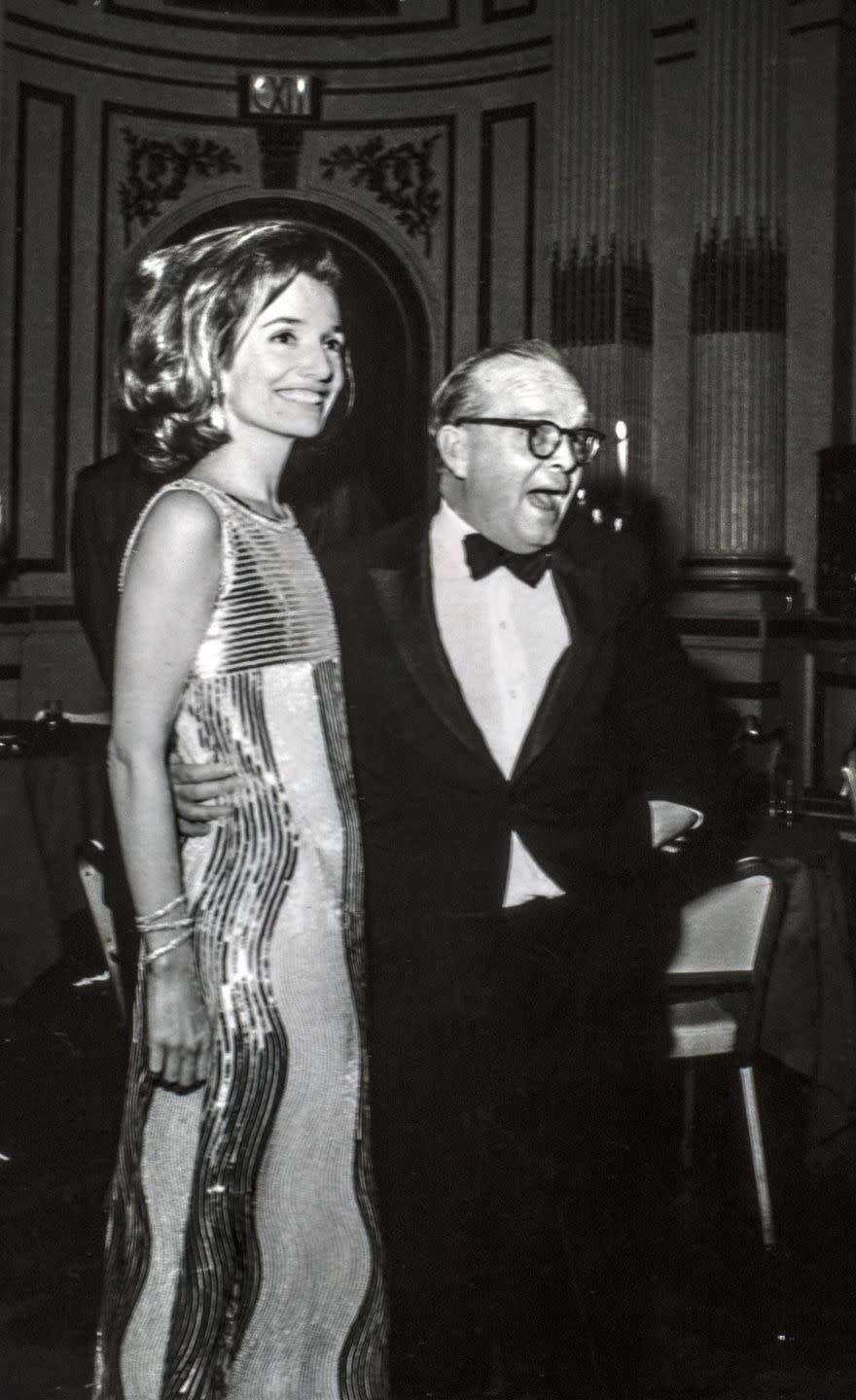
ARTHUR SCHLESINGER JR., historian: I saw Betty Bacall dancing out on the floor. I’ve known her for years. So I went and started to cut in. She looked at me with considerable scorn and said, “Don’t you see whom I’m dancing with?” And I looked, and it turned out to be Jerry Robbins, whom I had never met. So I retired very crestfallen.
LAUREN BACALL, actress: Jerry and I had danced in California. From then on whenever we met and there was music we gravitated to one another.
DR. RUSSELL MAXFIELD, Kansas friend: I asked Lauren Bacall to dance. Oh, boy! She’d just been dancing with Jerry Robbins, a fantastic dancer, and I was kind of embarrassed. But I went up to her table and asked her. That was the reason for the mask. You were supposed to be able to ask anyone and they would have to dance with you. She was a perfect lady. She’d just sat down. I didn’t realize she was so exhausted. On the dance floor she talked about how hot it was. We did just a little two-step and then I took her over and sat her down.
CHRISTOPHER CERF, guest: I was just out of college. I remember dancing with Mia Farrow a lot. That was pretty exciting. She seemed to be my age when everybody else was a lot older.
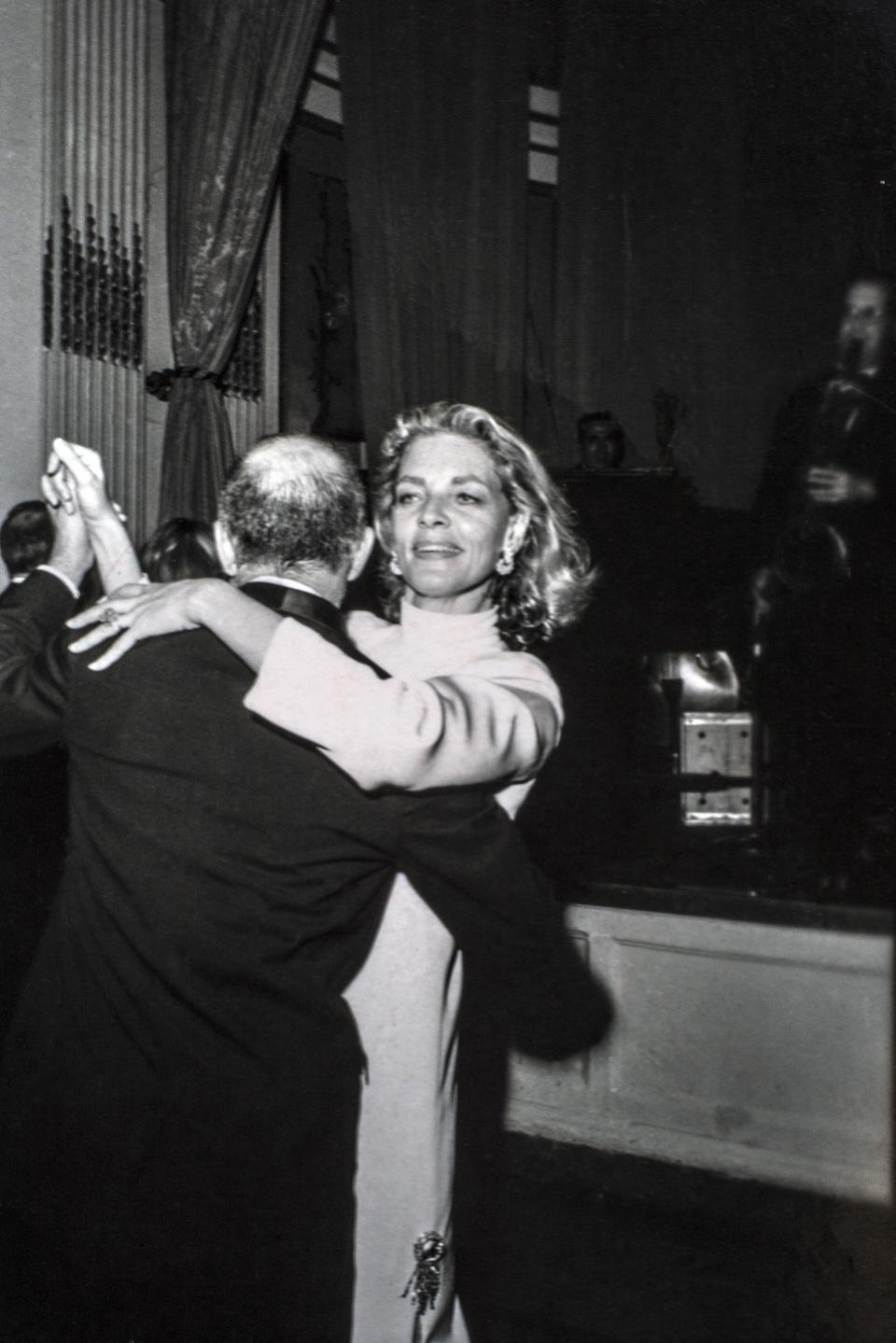
SUSAN PAYSON BURKE, crasher: I was just out of college, working in New York. I had gone with a date to some black-tie party, and we were having a drink at Trader Vic’s at the Plaza. We saw all these lights and cameras. My date, a guy from Texas named Jerry Jones, took my arm, we walked into the Plaza ballroom with a bunch of people, and they never checked us. It was fabulous. The first person I saw was Mia Farrow. And there was Frank Sinatra and every person in the world whose face I’d seen in the papers. Truman came up and he couldn’t have been more friendly. He said, “I’m so glad you’re here.”
I said, “Yes, it’s awfully nice of you. I’m Susan Payson.”
He said, “Oh, yes, of course.” My date said, “I’m Jerry Jones.”
“Oh, yes,” Truman said. “I don’t remember where you’re sitting, but why don’t you come to this table.” He introduced us. “These are my friends from Kansas.”
“Kansas?”
“Yes.”
“And what do you do?”
One guy said, “I’m with the police. I’m a detective.”
All of a sudden it dawned on us. We were smack in the center of Truman’s cast of characters of In Cold Blood. It was divine. We stayed until the end, we danced and had the most marvelous time. Didn’t know a soul. I danced with the detective.
I saw Truman a few years later out at Phyllis and Bennett Cerf’s. He looked at me and I smiled. Finally, at a quiet point, I said, “Truman, you looked like you might remember me, but I don’t think you really know from where.”
He said, “No.”
I went on. “Actually, I was the only person, with my date, who managed to crash your famous Black-and-White Ball in New York.”
He said, “No!” in that high little voice. I told him this with some trepidation. But he thought it was the most wonderful thing. From then on, he would take my hand and say, “This is the person who crashed my party.” Even toward the end, when he wasn’t, sadly, in very great shape, he would always remember me. “This is the girl…”
DR. RUSSELL MAXFIELD: Truman had us sit right across from the steps that go down into the ballroom so that we could see everybody as they came in. There were more secret service and security looking out for the people with jewels than there were guests. I remember Alice Longworth, kings and queens, Rose Kennedy; it was just unreal. I sat by Henry Fonda. I really enjoyed visiting with him. He didn’t ask about our Kansas connection with Truman.

KENNETH JAY LANE, jewelry designer:I remember meeting Tallulah Bankhead for the first and last time. She looked exactly like Tallulah Bankhead.
GEORGE PLIMPTON: Tallulah Bankhead wore an extraordinary mask made up to look like a great bird of prey. She was startled and very pleased by the number of people who stopped by her table to chat. One of them was a man named Jesse Levy, who curiously is not on the guest list but was there in the Plaza ballroom nevertheless. He must have made quite an impression. According to Brendan Gill, he became her paid steward-secretary-escort, whatever … played the piano for her, cooked her meals…. When she died he was left the piano and a quarter of her estate. So at least as far as Tallulah Bankhead was concerned, and indeed Jesse Levy, they must have been very grateful to Truman.
CANDICE BERGEN, actress: I remember faces: Frank Sinatra and Mia Farrow, Norman Mailer, Douglas Fairbanks Jr. wearing a black executioner’s hood, Henry Ford II. I was a new girl in town and wasn’t really sure why I’d been invited. I was dressed in a white mink rabbit mask made by Halston … quite enough to live down for the next twenty-five years. Of course, at the time, I thought I looked sensational. I remember the ball being a lot of work. I never really shared that exalted sense of entitlement that these people enjoyed.
The other thing to remember about Truman’s ball was that it was during Vietnam. I remember the guilt I felt, or actually the guilt that other people thought I should feel. I was nineteen, l think. Reporters accosted me. “Wasn’t it inappropriate to have a ball for five hundred people when a war was going on?” Someone said—could it have been Douglas Fairbanks in his executioner’s hood?—“The question’s inappropriate.” Somebody else, who was wearing a mouse mask with little ears, said, “The war’s inappropriate.” Nowadays I don’t see how anyone can rationalize a gesture like a ball.
NORMAN PODHORETZ, editor: There was almost a fight between Norman Mailer and McGeorge Bundy. Bundy had been at the White House and there were ugly words. I remember Mailer saying to Bundy, “I paid you too much respect.” He actually, I think, invited Bundy outside. Bundy said something haughty. He said, “Mr. Mailer, I think this is silly, you’re childish,” or words to that effect. But for the rest, it was great fun and very glamorous—especially if you weren’t used to that kind of glamour.
NORMAN MAILER: That night I had an altercation with McGeorge Bundy and invited him outside. We had an argument about Vietnam and at one point he put his hand on me very kindly and said, “Well, of course, you really don’t know much about it.” I said, “Let’s go downstairs.” I was very brave, because he was in better physical condition than I was. He was one of those handball-type players and I was dissolute and full of drink. But I’d have killed him that night I was so angry. I had a terrible argument with Lillian Hellman as a result of that, because she overheard it. She turned on me right in front of him and said, “How dare you, Norman!” I said, “You get lost.” We had this huge fight like an older sister and her kid brother. Right in front of McGeorge Bundy. Anyway, Truman’s responsible for all of this. Now, multiply this by—there are only three of us—one hundred and thirty-three, and the scenes you got!...
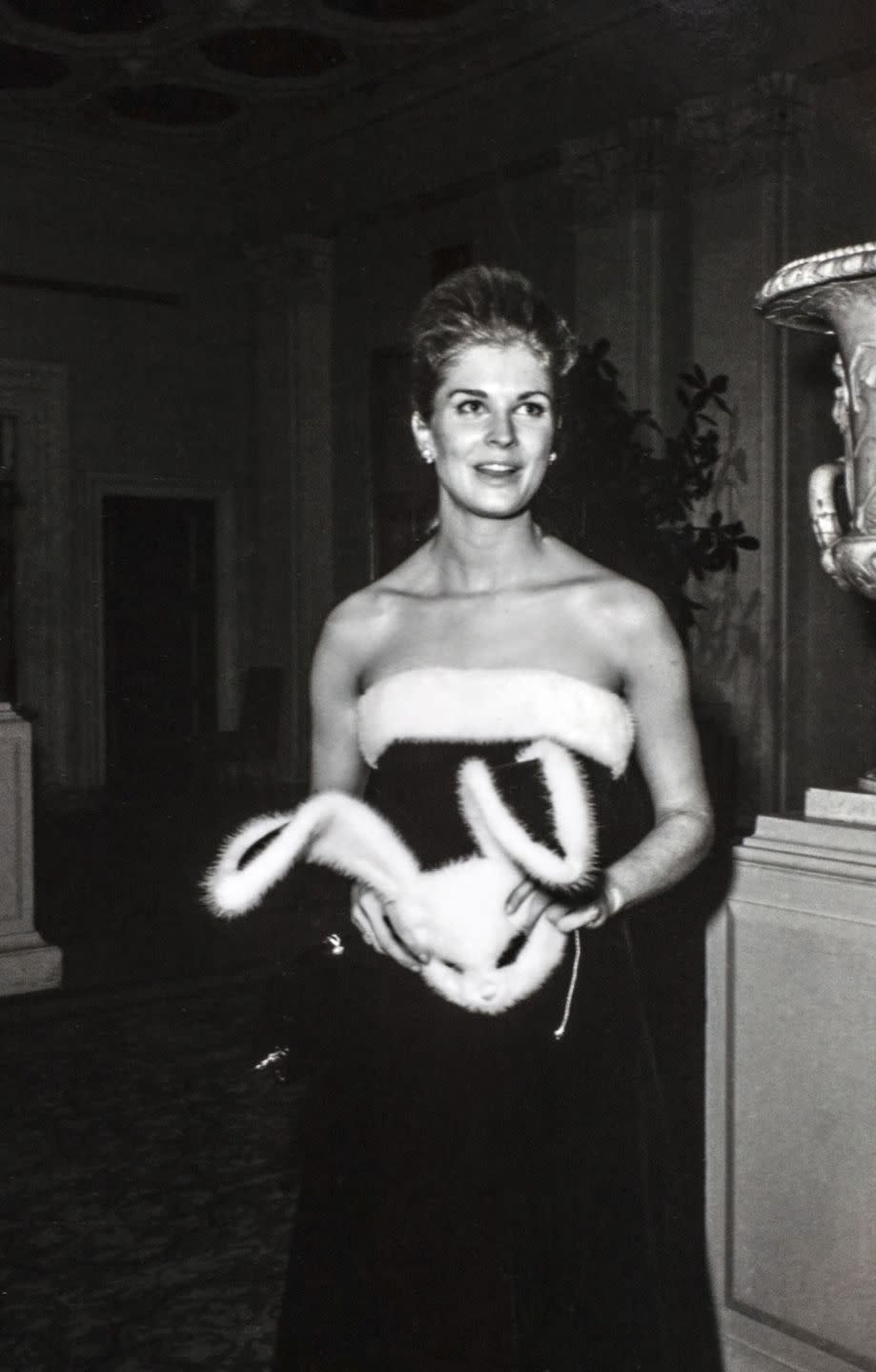
MCGEORGE BUNDY, executive: The fall of ’66 would be relatively early for a war argument. The level of feeling got much higher later on. But a lot of people like Norman—and it is to his credit—were already angry about the war. So a real-live warmonger served up after the third drink proved an irresistible target. The serious point, in fairness to both of us, is that it did not escalate. I had a fine time before and alter that. Plaza balls are not a matter on which I’m a good witness, but this was a helluva Plaza ball!
JOHN KENNETH GALBRAITH: It was one of those rare occasions when you knew by sight or by fame or infamy everybody there. I particularly remember organizing a musical football game with George Plimpton. Somebody had come, as I recall, in a top hat and we were using it as a football. A grand evening. Of all the evenings that have disappeared from my memory, this one is distinctive in the way it remains.
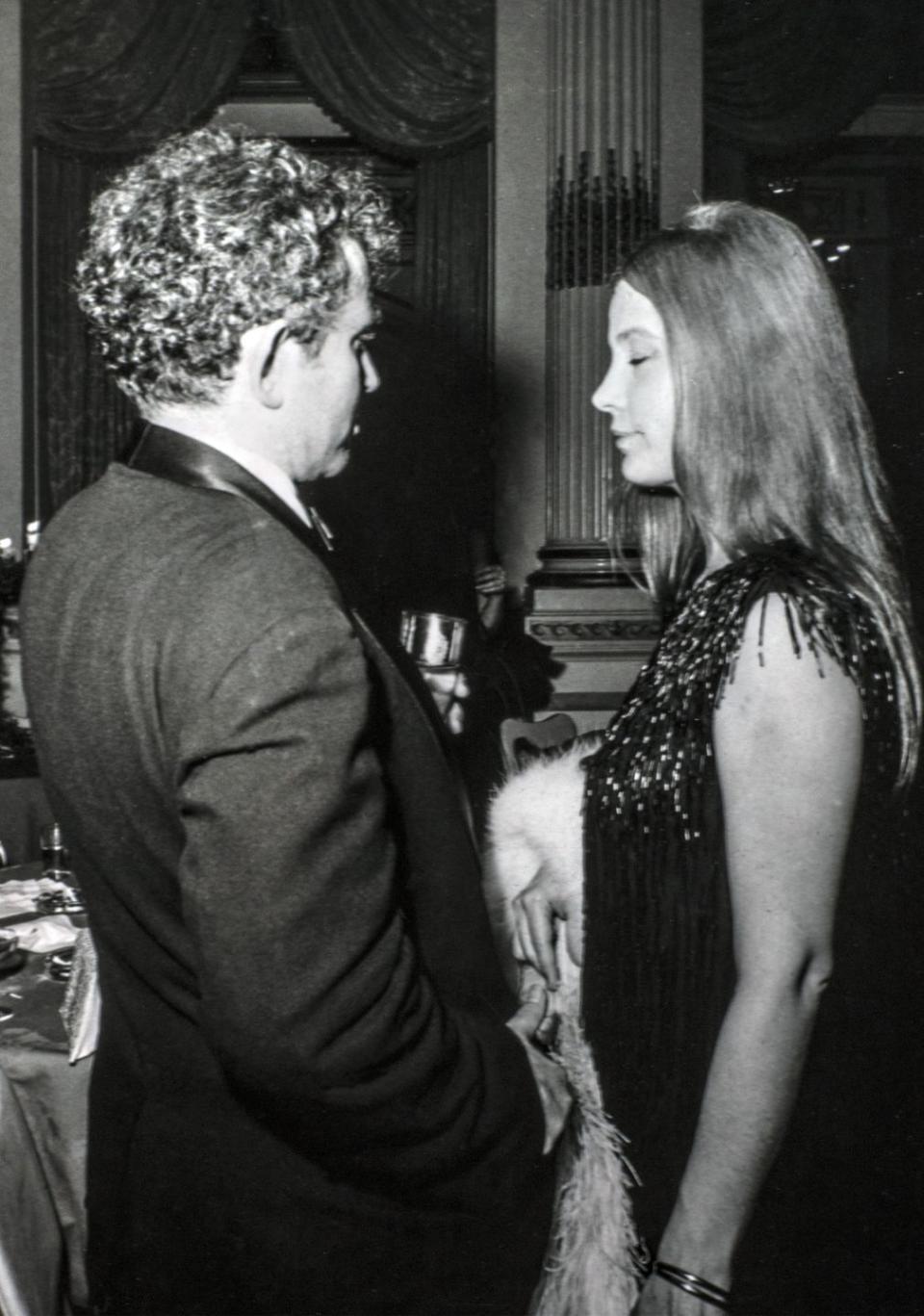
JILL FOX: I remember being pushed around in a chair over the ballroom floor by Ken Galbraith, or was it George Plimpton? There was a top hat involved. Was I in a football game? Was I in the backfield? Certainly it was the gayest moment of the evening.
HERB CAEN: About midnight, Sinatra was having a bad time. He was with Mia. He said, “Hey, let’s get out of here.” So we were sneaking out to go to Jilly’s, that awful bar he used to hang out in. Truman caught us at the door and tried to put a body block on us. I said, “We’re leaving, but we’ll come back.” He said, “No, you won’t. You won’t come back, I know you won’t come back.”
Well, we didn’t. I think he was hurt. It was one of those great parties that never got off the ground. People did what they always do—getting up to go into their little cliques and corners.
ALAN PRYCE-JONES, writer: I thought it was one of the more terrible parties I’d ever seen. Everybody tremendously got up in mundane masks, television cameras flashing. I left with Marianne Moore around midnight.
JOAN AXELROD, friend: In retrospect, I would feel very superstitious giving myself a party like that. It’s like putting a period on the sentence.
DR. RUSSELL MAXFIELD: Those of us from Kansas were the first to arrive and the last to leave. When we went back to our rooms in the Plaza, Truman joined us. He was so excited. He wanted to talk to us all night.
JOHN SARGENT, publisher: In my diary I have this curious poem. I have no idea whose it is. It just sits there:
Truman Ca-potty
Is not nearly so dotty
As some of the people
Who went to his party.

NORMAN PODHORETZ: I was flabbergasted by the way the world responded to that party. It was the first such party, to my knowledge, publicized that intensively. The guest list was published in The New York Times. I don’t remember any party before or since treated that way…. Whoever decided to give it that kind of coverage sensed, and maybe quite accurately, that this party represented some turning point in the cultural history of the United States, in that the confluence of the fashionable social world, the literary world, and the world of political power was embodied in that guest list. Those are worlds that in this country, in contrast with, say, England or France, have been separate and have rarely intersected. One reason is that the United States is unusual in having its political capital in a different city from its cultural capital. London, Paris, or in pre-World War II Berlin or Vienna—all the great European countries had the cultural center and the political capital in the same place. With the Kennedy years, this split began to be bridged. I think Truman had a very shrewd sense of this process and he dramatized the change by making that party’s guest of honor a Washington figure, Kay Graham.
LOUIS AUCHINCLOSS, lawyer, novelist: I had a client, now long-deceased, who was going to another law firm; when she read that I’d been at the party, she decided to stay with me a little longer.
JOEL SCHUMACHER: The ball reminded me of those incredible drawings from Thackeray’s Vanity Fair, illustrations of rich, unconscious people getting dressed up and dancing on the edge of the abyss with skeletons. It was like the barbecue at the Wilkses at the beginning of Gone with the Wind, all these people playing out this thing while the Civil War was happening under their noses.
NORMAN MAILER: I got an award from Women’s Wear Daily for worst-dressed man at the ball. But I have lovely memories of it. It was one of the best parties I ever went to. There was so much action … so many people whom you’d never met before. I mean, there was Tallulah Bankhead! For her, in those twenty years since The Naked and the Dead and its use of fug for fuck, I had been “the young man who couldn’t spell.”
Everybody there felt anointed that night. I think that’s Truman’s greatest coup. To me, that party’s greater than any of his books.
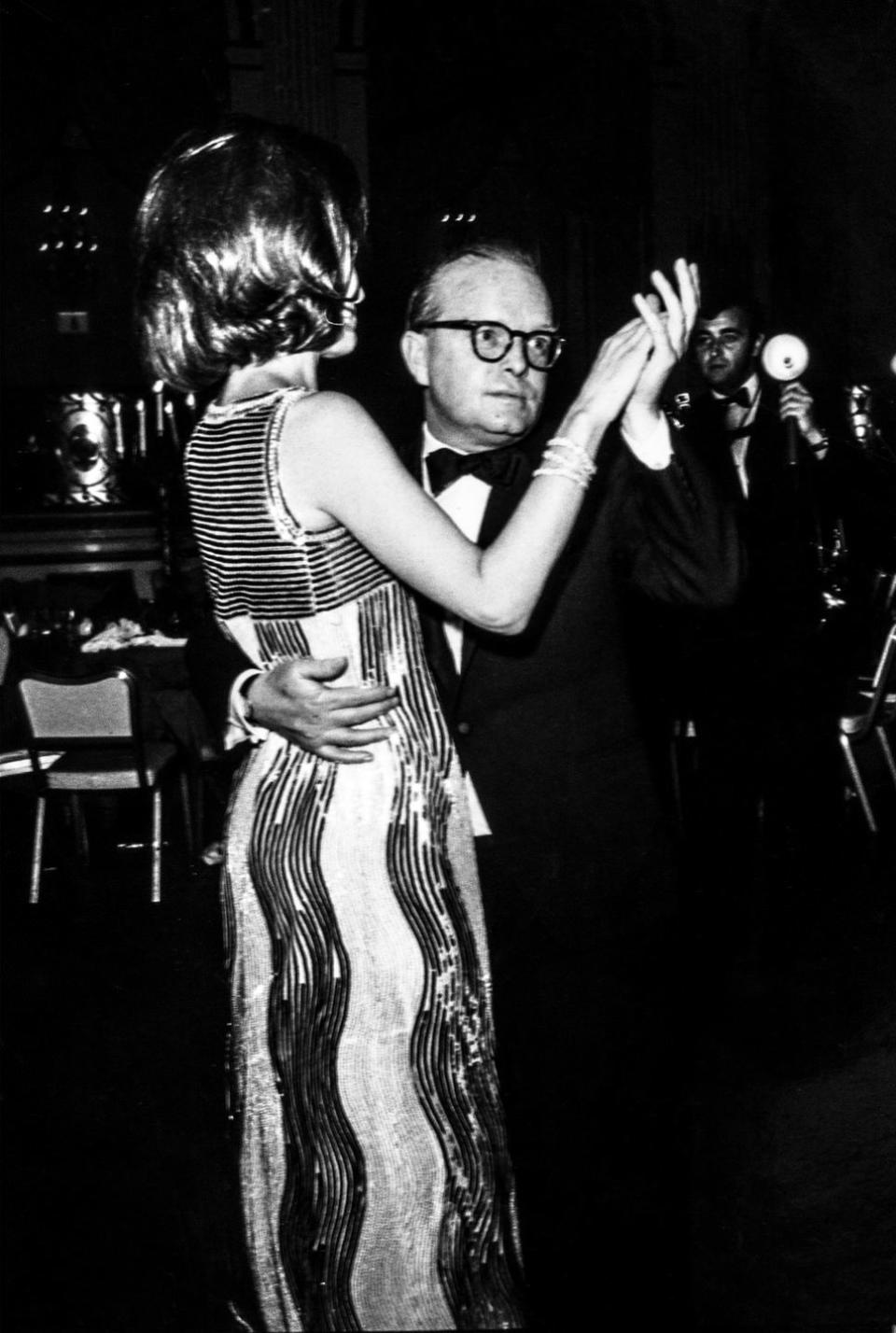
GORDON PARKS: I’ve been to some very extravagant parties. I would say Truman’s, in terms of extravagance, ranked about a seven on a scale of ten. You ask what hit ten? Well, a party the Duke of Edinburgh gave in London…
PETER DUCHIN: It definitely sits up there, oh, definitely a top-ten party, because it was so civilized. There have been others—one of the most memorable involved a woman who called from Chicago and asked me to bring a fourteen-piece band to the Palmer House to play for her fiftieth anniversary. We showed up in quite a small room, and there was a table set for two on the edge of this rather small dance floor. Thinking perhaps I was in the wrong room, I asked the captain, and he said, “No, this is her party, right there,” so I set up, and there we played, a fourteen-piece band, for a dinner à deux, for this woman and her husband. About eight people stood around serving them, and they danced between courses. The only thing she’d said to me was “Please don’t play too loud.”
C.Z. GUEST, friend: They don’t give parties like that anymore because everyone’s dead, unfortunately.
JOEL SCHUMACHER: There are a lot of people who can get by in life by having the talent to amuse. I can’t criticize that. If you can live with it on your own terms—then fine. But with Truman we’re talking about a great American writer … for all those years to have gone by and for so little to have emerged. He was treated like a Pekingese, sitting on a needlepoint pillow for everybody to say, How darling, how bitchy. I think the ball, in many ways, was the beginning of the end. The celebrity of it took precedence over his own craft.
JOE PETROCIK, friend: The year before he died he began talking about doing another ball. It was just one of his little pipe dreams, but he talked about it frequently. He was going to give it in Asunción, Paraguay. He was absolutely convinced that everybody he’d want to invite had never been to that place, and that they’d come.
JASON EPSTEIN, editor: I had fun at it. I wouldn’t mind going again, if only somebody would ask me.
You Might Also Like